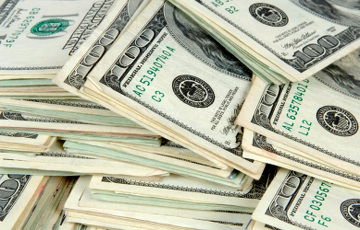Lukashenka’s Regime at the Verge of Technical Default
10- 11.04.2022, 11:31
- 20,132

Belarusian officials say the country does not have enough euros and dollars.
The Council of Ministers and the National Bank of Belarus adopted a resolution. It fixes payments for loans of the International and European Banks for Reconstruction and Development and the Nordic Investment Bank in Belarusian rubles. However, the officials have decided not to repay debts to the residents of the countries carrying out "unfriendly activities" at all. Ekaterina Bornukova, academic director of BEROC, in conversation with Belsat says that such measures are a technical default.
Belarusian officials say the country lacks euros and dollars due to sanctions. In this regard, they decided to return loans from the International and European Bank for Reconstruction and Development and the Nordic Investment Bank in Belarusian rubles. In addition, officials drew up a list of countries carrying out "unfriendly acts" against Belarus. Lukashenka issued a decree allowing not to return debts to residents of these countries. The list includes Australia, the EU countries, Canada, Liechtenstein, Norway, New Zealand, Albania, Iceland, Macedonia, the UK, USA, Montenegro and Switzerland.
"This is a technical default. When they say to the creditors: "Here is your debt in Belarusian rubles, take it. But the contract clearly stipulates the payment must be in another currency, this is a technical default. So far, it happens only with some creditors, it's interesting that the Belarusian authorities do not say such things to Russia. Such a selective technical default," explains Ekaterina Bornukova, the Academic Director of BEROC.
It is noteworthy that Lukashenka resolved the technical default back in March when he signed the decree №93 "On additional measures to ensure the stable functioning of the economy". It reads as follows:
"In case of imposition of restrictive measures by unfriendly countries, implying an actual "freezing" of investment projects implemented in Belarus, the suspension of their financing, deprivation of technical ability to conduct settlements on public debt in foreign currency, the Ministry of Finance, agent banks and other entities are entitled by decision of the Council of Ministers (its Presidium) to fulfill obligations to such countries in the national currency".
As a matter of fact, it becomes increasingly difficult for Belarus to pay off its foreign debts. One can't rely on foreign exchange reserves either. According to the economists of the Nashi Dengi Telegram channel, the National Bank has only $2.8 billion of "live" money left. Gold and foreign exchange reserves in March decreased by 8.4% overall. As a result, on April 1, 2022, they amounted to $7.57 billion.
How could a probable default affect the Belarusians?
Economists say the technical default can affect Belarusians who keep their foreign currency savings in banks or buy bonds of the Ministry of Finance. In such a case, people will be able to get their money back only in Belarusian rubles.
However, this may be the only consequence of a possible default of the country for the citizens so far, says Katerina Bornukova.
"The immediate effect of the default is that the state will not be able to borrow any more on foreign and domestic markets. However, this issue is not so actual for us, because we can't borrow on the foreign markets for a long time. Loans that are taken on the domestic market are not exactly on market grounds. The fact is that Belarusian banks are simply forced to buy government bonds. And even now, when we observe a selective technical default, they cannot say they do not want to buy new shares and want to return the old ones. In principle, it should not occur," says the economist.
Another consequence of the default may be the creditors' demand for the return of their funds. However, it is unknown whether Belarus has previously received loans with such demands, says Katerina Bornukova.
"The default undermines the image of Belarus as a state in the long run. Previously, our country always tried to pay its debts on time. But now, non-payment will affect the attitude to the country. Even if Lukashenka resigns, if the regime changes, it will still be extremely difficult to wash away the former default, because investors are not interested in political aspects and remember the past very well. Therefore, it will have to pay for this in the future with higher interest rates on loans," says the expert.
Back in the middle of March, the Moody's agency defined the rating of our country as "Ca". The indicator of the economy collapsed by four points at once and received a negative value, indicating the probability of default. Moodyʼs experts predict the national debt of Belarus will reach 60% of GDP this year. Gold and foreign currency reserves will be exhausted rather quickly.
The inflow of foreign currency into the country is also in question. At the end of 2021, almost 25% of Belarusian exports went to the EU. Now, due to sanctions in response to the support of Russian aggression in Ukraine, trade with the West has come to a halt. And there is no hope for new loans in the current situation.










